Women and men alike dream of having manageable, frizz-free, smooth, silky straight, and sleek hair. And keratin treatment offers so many solutions for this all at once! However, it’s no surprise that keratin treatment causes hair damage due to harsh chemicals and intense heat used throughout the procedure.
Imagine you are all dressed up and ready for your perfect fancy dinner date but suddenly, you see your hair strands on your shoulder. A complete mood killer, right?
According to research, 21 million women suffer from hair loss by age 35, and most people lose 100 hair strands a day. But is there a way to reduce this? Absolutely yes!
There are many ways to reduce hair fall completely or to some extent, whether by natural means or with the help of some products. So without any further ado, let’s find out how to stop hair fall after keratin treatment.
Table of content
Does keratin cause hair loss?

Yes, the strong chemicals used to create keratin treatments can result in hair loss. Sometimes these chemicals can burn and irritate the scalp instantly or over time, resulting in itching and significant hair loss.
It gets more worrying when seeing scalp skin.
Most people use keratin at home or in a salon to restore their dry, damaged hair follicles. It gives your hair a new look, as most people will verify, and it works brilliantly.
After having a keratin treatment, you can tell your hair is shinier and healthier just by running your fingers through it.
However, not everyone benefits from keratin treatments, as there are always some exceptions. When utilizing keratin, some people get unexpected effects. They have more hair loss than usual, and their hair doesn't recover; instead, it gets drier and more damaged.
When too much keratin is deposited, it leads to build-up, making hair dry and brittle.
Read more: Does keratin cause hair loss?
As your leading source for hair health information over the past 4 years, we never compromise on accuracy. When it comes to your health, you deserve information you can truly rely on - and earning your trust is our top priority.
Here's how Scandinavian Biolabs ensures every piece of content meets the highest standards of accuracy and integrity:
- Credentialed Experts: Our reviewers are actively practicing doctors and medical researchers
- Stringent Reviews: Content undergoes rigorous editing by subject specialists and review by a practicing doctor.
- Evidence-Based: We rely on well-established research from trusted scientific sources like peer-reviewed journals and health authorities.
- Full Transparency: Our editorial standards, writer credentials, reviewer credentials, correction process, and funding are all publicly documented.
- Independent Voice: While we do promote products, we operate in a vacuum to business operations. Our main goal is just an unwavering commitment to providing medically-sound guidance.
You can count on Scandinavian Biolabs to consistently deliver the trustworthy health information you deserve. Read our Editorial Standards.
Is keratin treatment good for hair loss?
Keratin treatment is not primarily aimed at treating hair loss. It's designed to smooth and add shine to frizzy or curly hair. While it can make hair appear fuller and healthier, it doesn't address the root causes of hair loss such as hormonal imbalances, nutritional deficiencies, or medical conditions.
Read more: Is keratin treatment good for hair loss?
Why does keratin cause hair loss?
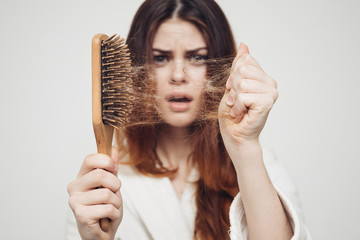
Keratin is known to do wonders by giving you silky, straight, and shiny hair, but why does hair fall occur when keratin is supposed to produce beneficial effects?
There are three main reasons why keratin could result in hair loss. It can be the abrasive chemicals used in the product's manufacture, the fact that your scalp is extremely sensitive, or the intense heat applied when applying keratin. Let’s look at each reason in more depth.
- Your skin, nails, and hair are made of keratin, a protective protein that is created by your body on a biological basis. However, the keratin utilized in the production of keratin hair treatments is taken from the horns, skin of animals, wool, and feathers.
- Chemicals like formaldehyde, which can be bad for your health and scalp, are also added by manufacturers. Keratin is a naturally occurring protein in your body that is thought to have magical properties for your skin, nails, and hair.
- You apply a product like this to your hair in the hopes that it will look thicker and more glossy when it is finished. But is it usually like that? No.
Treatments often have formaldehyde
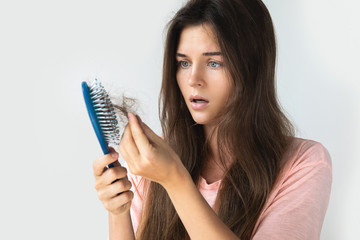
Many harmful substances, including formaldehyde, are present in synthetic keratin therapy for healthy hair growth. Hair loss is a common side effect of synthetic keratin because formaldehyde is a harmful substance that can lead to human cancer.
When formaldehyde-infused keratin is applied to the hair, it weakens the hair follicles and could facilitate hair loss.
Your scalp might be sensitive
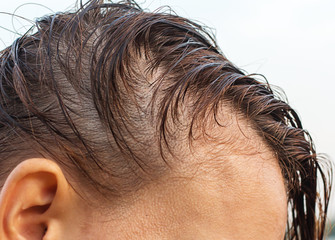
Any harsh chemical used on the hair may upset individuals with sensitive scalps. If your scalp is very delicate (which it is), you should avoid keratin treatment and similar harsh chemicals.
There are several indicators of a sensitive scalp. Have you noticed unpleasant scalp symptoms like pain, itching, burning, or redness? These could result from stress, a change in cosmetics, food, or your surroundings.
Make sure your stylist knows this ahead of time if it is the case, so they don't soak your hair in keratin if they have to apply it as a therapy solution. By doing this, you can eventually prevent significant hair loss.
High heat burns hair.
Do you know how exactly keratin treatments work? If not, then allow us to walk you through it. During this procedure, your hair will be treated with keratin, dried with a blow dryer, and sealed with a flat iron. Your stylist uses a hot flat iron to straighten your hair.
Extreme heat from the flat iron damages hair by making it dry and brittle, especially when used frequently, which eventually results in hair loss. Even though using keratin may cause temporary hair loss, the hair will eventually regrow.
9 best and easiest ways to stop hair fall after keratin treatment
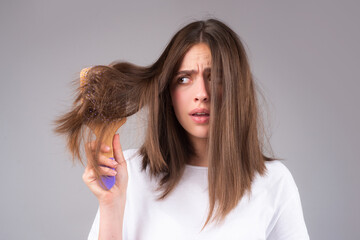
Normal hair care products are not made entirely of keratin. While the extra chemicals may harm some people, others may still benefit.
If you experience an alarming hair fall due to a keratin treatment, here are some super easy ways to minimize or stop hair loss and regrow hair after keratin treatment.
Read this: 9 Best Hair Loss Treatment For Female UK (Update 2023)
1. Apply nourishing conditioner

Whenever your hair comes into contact with water during a shower, it swells up, causing keratin, moisture, and other beneficial elements to begin leaking out.
Therefore, you must moisturize your dry hair with a moisture-rich conditioner and related hair products to delay the effects of the keratin treatment and lessen swelling after hair washing.
A hair recovery conditioner can help your hair by improving smoothness, durability, and can prevent breakage. It has aloe vera, capilia longa, and amino acid complex, which boosts your hair’s recovery, growth, and durability, respectively.
In addition, it has a lipid-based film for protection, increasing your hair's tenacity and preventing split ends.
2. Maintain a regular routine of hair washing
Chemicals included in keratin treatments are so abrasive that they can break your hair. Make sure you are not putting much pressure on your hair after this treatment. Therefore, you don't need to add any more dangerous chemicals to your hair.
To prevent further harm, use a gentle Hair Strength Shampoo when washing your hair. These shampoos have gentler cleansing ingredients than others, which will make your hair smoother after they remove grime and grease.
A regular wash using a mild shampoo also makes your scalp clean and stronger, keeping it away from infections that could damage your hair.
3. Shampoo and massage your scalp
If you've had a keratin treatment and are worried about hair loss, a good habit to get into is massaging your scalp after you wash your hair. You can stop hair loss and promote hair growth by doing this.
Additionally, it will aid in blood flow improvement and anxiety and stress relief. When massaging your scalp, use only hair growth oils like coconut and castor.
Thanks to these oils, your hair will become stronger, grow faster, and develop less dandruff. To do this properly, you must use even pressure throughout the entire scalp while you massage it with your fingertips.
4. Reduce stress
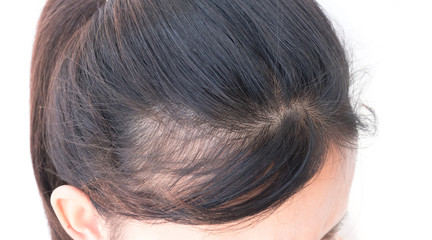
Stress can cause a number of unpleasant side effects, including loss of hair. Additional negative impacts of stress include the development of acne, dandruff, and gray hair.
It is challenging to keep a stress-free mindset when you see hair thinning. However, try to maintain as much composure as possible in the aftermath of a keratin treatment to prevent further hair loss.
You need to find ways to manage your stress, despite the fact that it will be difficult for you to do so. Do everything in your power to keep your mind off the fact that your hair is getting thinner.
A good example of methods to alleviate stressful event and regain hair loss from stress is physical activity, a balanced diet, yoga, and enough sleep.
5. Never brush or comb your wet hair.
When hair is wet, it is more likely to break and shed than dry. This is because proteins in damp hair generate weaker bonds (hydrogen bonds) than in dry hair, which has stronger bonds (protein linkage).
Therefore, it is best to wait to brush or comb it until it has totally dried. If you do not exercise caution, you run the risk of tearing the hair out from its follicles if you stretch the hair beyond its natural limits at this stage.
If you have problems with tangled hair after washing it, brushing it while it's still damp is your best bet. In this case, you should avoid brushing your hair using a traditional brush on your damp hair. Choose a wide tooth comb and smooth edges to prevent any scalp damage.
6. Stay hydrated.
Ensure that you stay hydrated after receiving a keratin treatment by drinking lots of water. A part of the hair shaft is made of water, so your body must have enough of it to keep your hair plump and hydrated.
Your hair suffers more damage from dehydration than you would realize. Your body may become dehydrated and develop split ends, which will make your hair more brittle and prone to breakage.
Additionally, it prevents hair from sprouting back. Water is a crucial part of nutrition, but sufficient nourishment is required for hair survival. Consuming plenty of water can help hydrating hair cells, strengthening hair strands and preventing hair loss.
7. Exercise
Consistent physical activity can help reduce hair loss, but this benefit is only shown when accompanied by a good diet. Regular physical activity boosts blood flow and circulation, increasing oxygen and nutrients reaching the scalp.
8. Have a balanced diet
Sometimes, hair loss that occurs after using keratin may not be related to the product itself. It can be a result of your poor eating habits. You can treat and even prevent hair loss by adhering to a balanced diet, which significantly influences hair health.
Vitamin D, antioxidants, iron, zinc, niacin and biotin should all be a part of your diet to ensure healthy hair development. You can get all these nutrients in eggs, nuts, fatty fish, fruits, and leafy greens.
9. Give your hair a break
The biggest mistake you can make for your hair is to visit a hairdresser so soon after getting a keratin treatment. Doing this will only ruin your hair further.
After receiving this treatment, your hair should appear healthier, shinier, and thicker; hence, you may be tempted to have it styled right away.
Read this: The 11 Best Hair Thickening Hacks You'll Ever Need (2022)
Nevertheless, it's possible that this is just the beginning of your fight against hair loss. Your hair needs a stress-free environment in order to recover its strength and vitality as quickly as possible.
If you don't do that, you run the risk of making it brittle, which eventually causes hair breakage and loss.
Does hair fall increase after keratin treatment?
Yes, keratin treatments can cause hair fall. This is especially true for women who receive the keratin treatment more than once or twice per year.
This is because keratin treatments involve a chemical process that can cause damage to the hair and scalp, leading to increased shedding of hair strands.
In addition, keratin treatments can make the hair more brittle and prone to breakage, which can also lead to increased shedding.
Therefore, keratin treatments are best avoided during hair loss periods, and should only be done a maximum of once or twice per year. This will help minimize the risk of further hair loss or damage.
How long does hair loss last after keratin treatment?
The length of time that hair loss lasts after keratin treatment can vary depending on the individual and the cause. For those who are experiencing allergic Telogen Effluvium, the hair should regrow naturally in three to six months if any underlying causes, such as depression or lack of proper nutrition, are addressed.
However, if the cause of hair loss is more serious or chronic, the period of hair loss may be longer and require medical intervention.
Additionally, keratin treatments can also cause hair loss due to over-processing or weak follicle structure, so it’s important to take extra care when going through keratin treatments and speak with a medical professional if hair loss persists.
In any case, it’s important to be patient and consistent in your hair care regimen while the hair returns to its normal state.
FAQs
Are keratin treatments bad for your hair, and do they cause damage or hair loss?
Keratin treatments can be beneficial for hair, but improper application or overuse may cause damage or hair loss. Results vary, and it's essential to consult a professional hairstylist for personalized advice.
Is keratin treatment good for hair, and can it prevent hair fall?
Keratin treatments may help with frizz and manageability but aren't specifically designed to prevent hair fall. Individual results may vary.
What is keratin and what is a keratin treatment?
Keratin is a protein found in hair, skin, and nails. A keratin treatment is a salon procedure that smooths and strengthens hair by infusing it with keratin, resulting in less frizz and increased manageability.
Read more:







